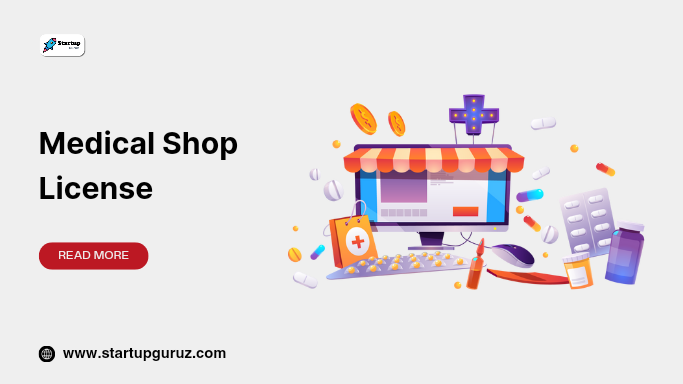Medical Shop License
Navigating the Process: A Comprehensive Guide to Obtaining a Medical Shop License in India
Introduction
In the thriving healthcare sector of India, establishing a medical shop is a lucrative venture. However, this journey begins with securing the necessary licenses to operate legally. This comprehensive guide aims to demystify the process of obtaining a medical shop license, providing insights, step-by-step procedures, and addressing common queries.

Understanding the Importance of a Medical Shop License
Significance in the Pharmaceutical Industry
A medical shop license is a legal requirement that ensures the safe and regulated distribution of pharmaceuticals. It is a testament to the government’s commitment to maintaining high standards in healthcare.
Legal Requirements for Operation
Operating without a valid medical shop license is not only illegal but also jeopardizes public health. Compliance with regulatory standards is essential to guarantee the authenticity, safety, and efficacy of the medicines being dispensed.
Eligibility Criteria for Obtaining a Medical Shop License
Educational Qualifications
Applicants are typically required to have a degree or diploma in pharmacy from a recognized institution. Educational qualifications vary by state.
Infrastructure Requirements
Medical shops must adhere to specific infrastructure standards, including a designated sales area, storage facilities, and sanitation requirements.
Experience Criteria
Some states may require applicants to have a minimum number of years of experience working in a pharmacy or healthcare-related field.
Step-by-Step Guide to Obtain a Medical Shop License
Application Process
- Preliminary Research: Conduct thorough research on the licensing requirements in your state. Regulations may differ, and it’s crucial to understand the specific criteria.
- Educational Qualifications: Ensure you meet the educational qualifications required by your state pharmacy council.
- Infrastructure Setup: Prepare your medical shop according to the prescribed standards. This includes ensuring proper storage conditions and sanitation.
- Application Submission: Submit the application form along with the required documents to the designated authority. The application form can usually be obtained from the state pharmacy council or regulatory body.
Documentation Required
- Proof of Educational Qualifications
- Identity and Address Proof
- Blueprint of the Premises
- No Objection Certificate (NOC) from the Landlord
- Registration Certificate of the Pharmacist
Inspection and Verification
After the submission of documents, an inspection of the premises may be conducted by a designated drug inspector. This step is crucial for verifying compliance with infrastructure and operational standards.
Common Challenges and Solutions
Addressing Potential Hurdles
Common challenges may include delays in the inspection process or rejection of the application. Engaging with professional consultants can help navigate these challenges efficiently.
Ensuring Compliance with Regulatory Standards
Staying updated on changes in pharmaceutical regulations and continuously meeting compliance standards is essential for the seamless operation of a medical shop.
FAQs About Medical Shop Licensing
1. What is the validity period of a medical shop license?
The validity period varies by state but is typically renewable annually.
2. Can a foreign national apply for a medical shop license in India?
In most states, Indian citizenship or residency is a prerequisite for obtaining a medical shop license.
3. What are the renewal procedures for a medical shop license?
Renewal procedures involve submitting updated documents and may require a follow-up inspection.
Tips for Streamlining the Licensing Process
Hiring Professional Consultants
Engaging with consultants experienced in pharmaceutical licensing can simplify the application and inspection processes.
Staying Informed About Regulatory Changes
Regularly check for updates in pharmaceutical regulations to ensure ongoing compliance and prevent any disruptions in operations.
Conclusion
Acquiring a medical shop license involves navigating through regulatory intricacies. This guide equips aspiring entrepreneurs and existing pharmacy owners with the knowledge needed to successfully obtain and maintain their medical shop licenses. By understanding the process, meeting eligibility criteria, and staying informed, entrepreneurs can embark on a legal and prosperous journey in the pharmaceutical landscape.